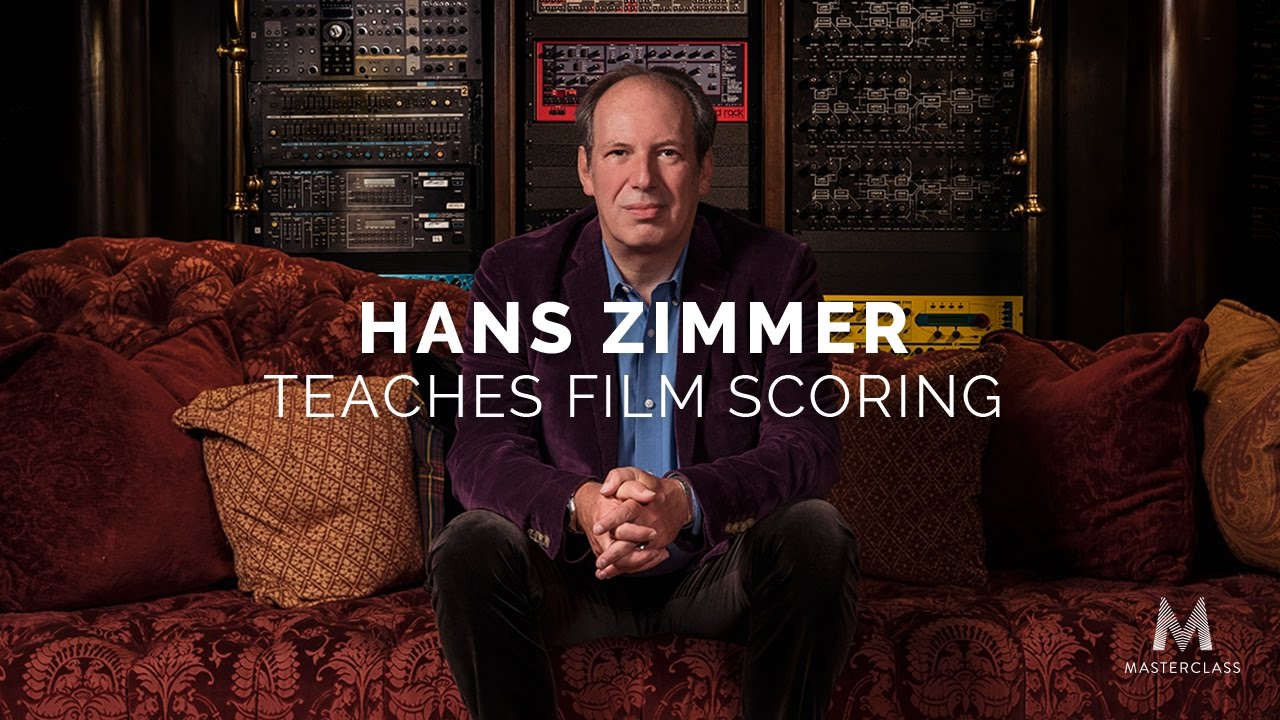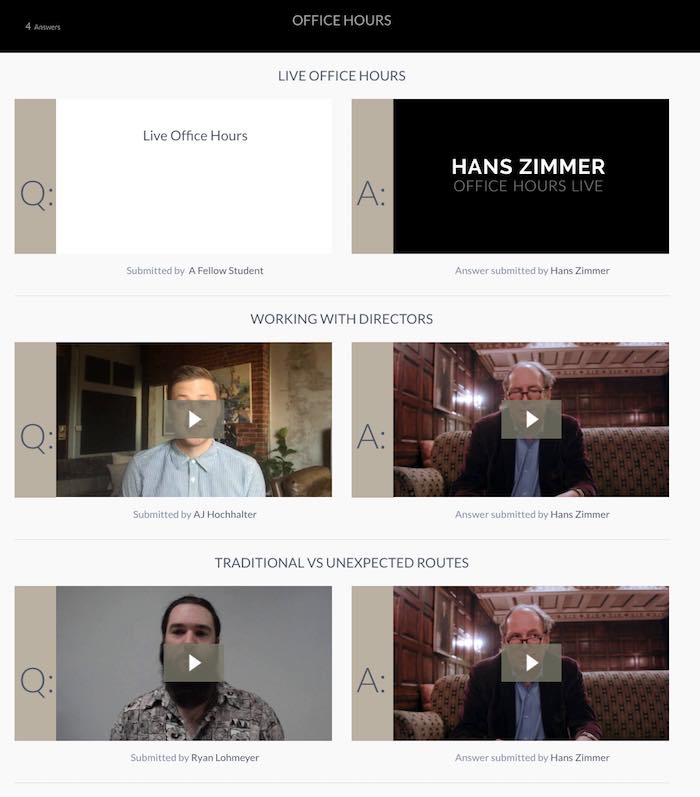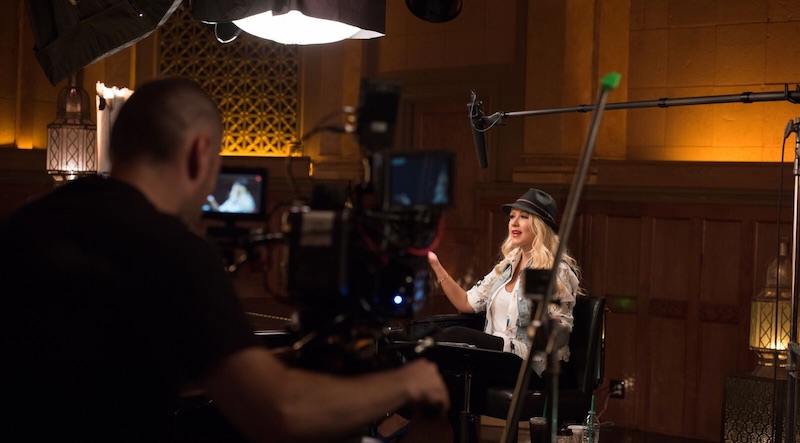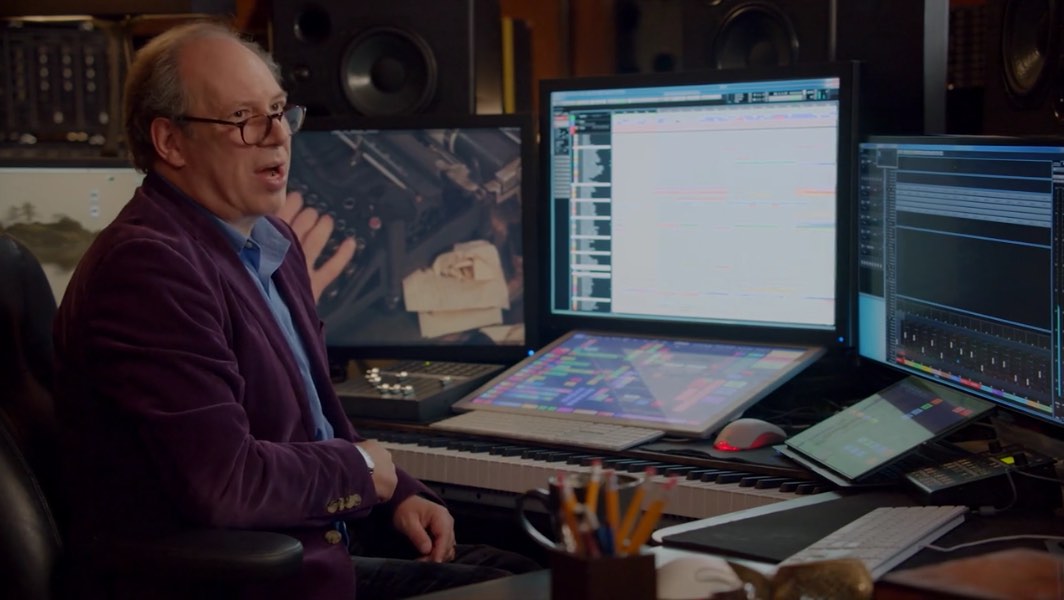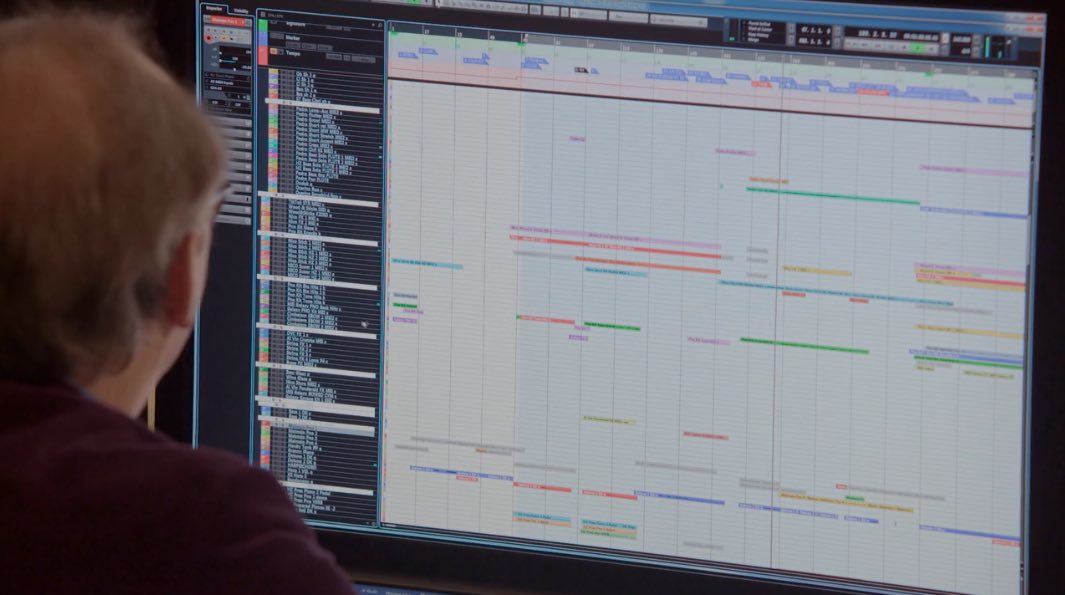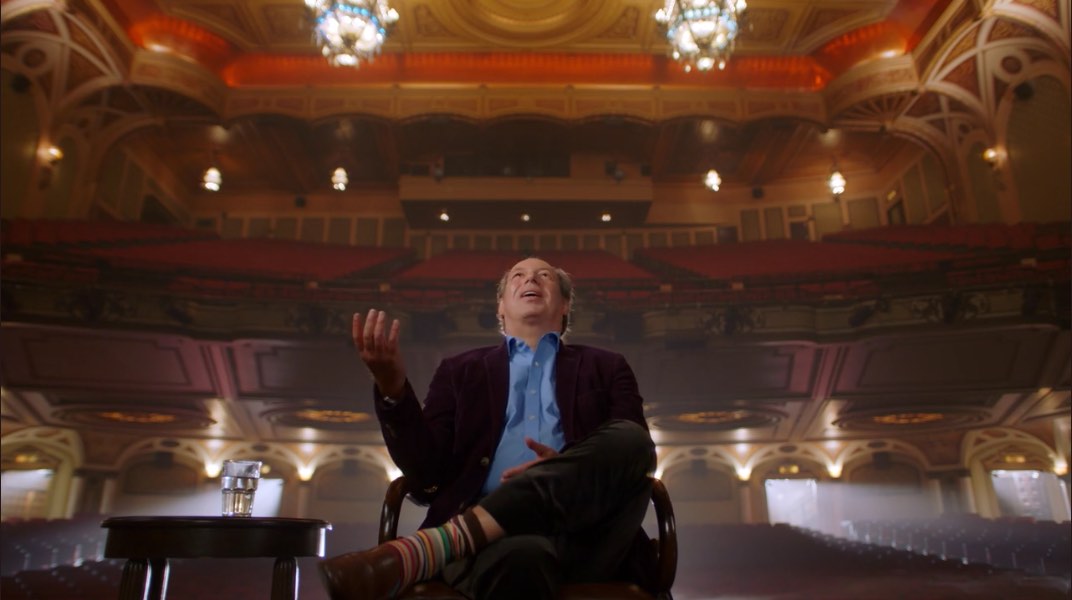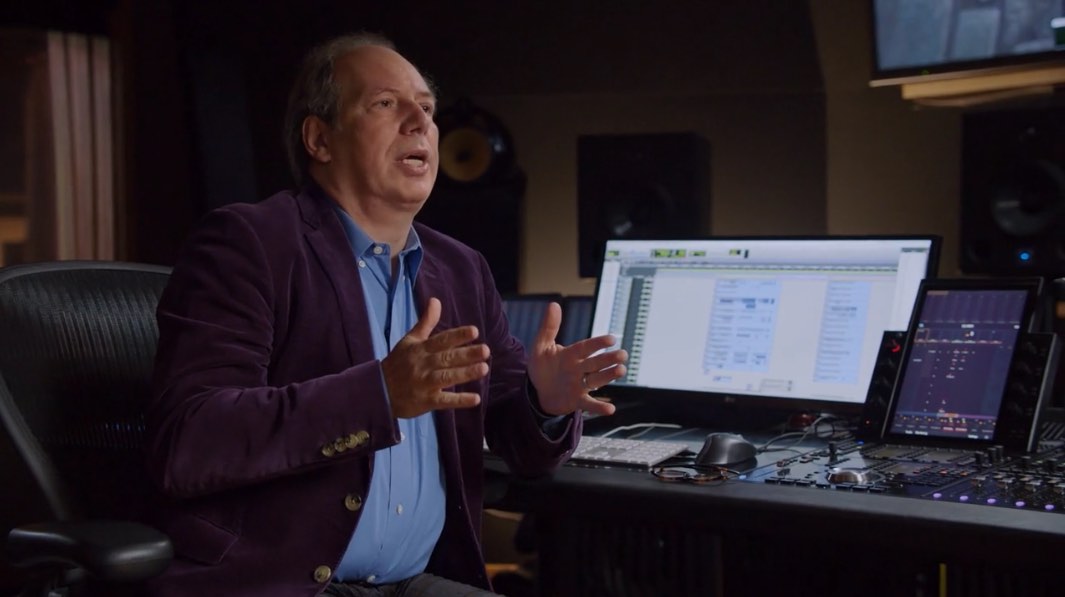Hans Zimmer Teaches Film Scoring – An Editor’s Review
- Hans Zimmer Teaches Film Scoring Masterclass Review
- Why Film Editors should take Hans Zimmer’s Masterclass
- 5 Things Film Editors Can Learn from Hans Zimmer
Why should an editor care about taking Hans Zimmer Teaches Film Scoring on MasterClass.com?
For many editors music and editing and not only inextricably linked, but they are almost the same job:
It’s a very similar job… Composing a piece of music is so similar in terms of joining small fragments together and making them all line up “magnetic North.”
The best cinema in my view is that which takes into account a musical feel and structure and aligns it to performance and story.
You have to be alive to the rhythm of things not necessarily just the rhythm of film scoring. – Joe Walker
Editor Joe Walker (Blade Runner 2049, Arrival, Sicario, 12 Years a Slave) should know what he’s talking about given that he was also a classical composer before he stepped into the editing chair.
But whether or not, as an editor, you’ve also got some kind of background in music, the role of music in film is crucial to not only its emotional impact but its pacing, rhythm, and structure.
As an editor I’m involved in picking music (temp or not), editing it to picture, adjust the picture to the music, mixing it with dialogue and trying to weave everything together as best I can. The better my abilities to do all these things, the better I’ll become as an editor.
For all of these reasons and more, I was extremely keen to check out Hans Zimmer Teaches Film Scoring, his new class on MasterClass.com.
UPDATE June 2023 – MasterClass is now more affordable!
A new pricing tier, that works out to £10/month when billed annually, will save you £48/year compared to previous pricing of £14/month. The only difference is no downloads and 1 device.
What is MasterClass.com?
If you’ve not heard of MasterClass.com it’s basically the cream of the crop when it comes to world-class contributors sharing their wisdom on their area of expertise, all for a very affordable price.
You can learn acting from Kevin Spacey, tennis from Serena Williams, cooking from Gordon Ramsey and even chess from Gary Kasparov. Not to mention a bundle of creative courses on writing novels, TV and movies.
Each course is comprised of many hours of interview-based video lessons, divided into specific topics and supported by downloadable PDFs and brought to life through homework assignments.
The courses I’ve taken also feature ‘Office Hours’ where Hans and Aaron have both conducted live Q+A sessions for students, which is a great way to add to your learning. There is also a very active community of students discussing topics and sharing ideas in the ‘hub’ forums.
As you get lifetime access to the course, you’re signing up for more than just a bunch of well made videos, but a supportive and enriching experience as well.
I’ve previously reviewed screenwriter Aaron Sorkin’s MasterClass here, as well as singled out some other MasterClass.com courses that I think are worth your time here.
There’s a point where we just let the music take over everything, and you can just turn it louder and louder because you realise the the momentum of the film is entirely defined by the structure of the music, as the film sort of snowballs towards the end.
– Christopher Nolan
All of these ideas can be found in this behind the scenes featurette from the making of Inception.
In this really nice video from Vanity Fair you can get a quick overview of some of Hans’ Greatest Hits, as he rolls out his career timeline. It starts with My Beautiful Laundrette, and (in this video) ends with Blue Planet II.
It’s actually a really well crafted interview, with plenty of personal anecdotes and insights. Well worth a watch.
I’m still hunting down the great tune that I’ve never written. It’s somewhere out there. And that’s what makes me get up in the morning. I just know I can do better.
– Hans Zimmer.
UPDATE – Win MasterClass.com Subscriptions!
Studio Network Solutions got in touch to offer the readers of this blog a chance to win 1 of 5 subscriptions to MasterClass
Studio Network Solutions are actually the post-production hardware providers that keep the post team at MasterClass.com running.
You can read all about how they transformed their original hodge-podge of portable hard drives, into an efficient and effective SAN AND NAS Storage system, allowing them to flawlessly edit 4K multi-cam over 10-gig ethernet.
All you have to do to enter is retweet any of the tweets you see about the competition from myself or Studio Network Solutions or share this Facebook post about it before 31st July 2017.
I’ll then pick 5 winners at random, from the list of shares and retweets.
Hans Zimmer Teaches Film Scoring MasterClass Review
Hans Zimmer is one of my favourite composers.
His work features heavily in my daily life, as more often than not, I’m working to one of his scores while working on the blog or colour grading, for example.
It’s a close-fought battle between The Dark Knight and Interstellar soundtracks for what I instinctively turn on when I need to get in the zone. (Somehow, the intensity seems to make me work faster!)
Aside from John Williams he’s also probably had one of the biggest impacts on cinema’s musical landscape in the last 30 years. As a result he’s been nominated for an Oscar nine times (only winning once for The Lion King in 1995) and his IMDB page lists a further 110 awards wins and 185 nominations.
He also makes for a fantastic teacher.
His presentation style is most often clear cut yet with a self-effacing bombastic energy. He clearly loves what he does and cares deeply about delivering creatively for his director and his audience. As an example of this keep an eye on his choice of socks.
At the end of the day I can tell you everything you need to know in one word. Story.
Stick with the story, don’t abandon the story, don’t betray the story. Know the story that you want to tell.
I learned a huge amount about storytelling, filmmaking, music, structure, themes and creativity by taking this course and I’m pretty sure you will too.
It’s absolutely worth the price of admission.
So what do you get?
Hans Zimmer Teaches Film Scoring is broken down into 31 lessons, covering topics like:
- Creating simple themes
- Working with Directors
- Sound Palettes
- Scoring to Picture
- Understanding Tempo
- Working with Orchestras
- Thoughts on life as a Composer and a whole lot more
There are also film-specific case studies for The Dark Knight, Frost/Nixon, and Sherlock Holmes, as well as further, more specific lessons looking at the tempo of a scene in Sherlock Holmes or breaking down a character theme from Batman.
When discussing the Joker’s theme, Hans muses, ‘Is there such a thing as infinite tension?‘
Each course has a supporting PDF workbook that includes a six-week lesson plan that breaks up the course into a digestible schedule, recommended films to view alongside it, and chapter-specific summaries, assignments, and further resources.
If you’re serious about getting the most from the course, this is worth printing out and scribbling on.
One of my favourite lessons in the course was one called ‘Creating with Synths’ in which you get to watch Hans create an entire song from a single clanky tone (his synth ‘starter patch’) in a few imaginative minutes. This lesson has nearly 700 comments on it!
These comments are well worth mining for further information, such as what gear, software and apps he’s using in his astounding studio set up. One comment linked to u-he’s Dark Zebra and ZebraHZ synth packs which include all of the synth presets (400!) Han’s created for The Dark Knight.
The simplicity of the material then lets you go and expand outwards, but the kernel of the idea needs to be emotionally tight… then you know you’ve got something.
It’s amazing to watch Han’s expand upon an incredibly simple motif – he likes to say you should be able to play it with one finger! – and extrapolate that into a grand and iconic score, either in real-time like in the synths lesson or as he works through his ‘musical diary’ for Sherlock Holmes. Hans never deletes any of his early sketches, he merely keeps adding to his timeline, day after day, evolving the ideas.
Peppered throughout the course are details of Han’s recording techniques, which is a huge part of what makes the final score come alive, such as having the french horn section for Batman way up above the rest of the orchestra to create a three dimensional sonic soundstage, wherein the reverb of the church building they record in melds the two sets of horns on either side of the church, together in the dome of the building. But also because ‘the Batcall is in the sky’.
He also talks about how he casts musicians just as any director would cast actors, and drawing out the very best personal performance from them.
Why Film Editors should watch Hans Zimmer’s Masterclass
The drummer for the film composer is the editor. So you need to know your editor and know how your editor feels tempo.
One of the reasons film editors should watch Han’s Masterclass is not only will you learn a lot about how what music brings to filmmaking – it’s structure, themes, character arcs and pacing to name a few things – but also how to work with a composer, understanding the language they speak and the goals they’re trying to achieve.
Hans’ consistent focus on story, character and pushing creative boundaries is also inspiring, as is his mastery of the technical side of his craft. As editors these should all be our focus as well.
Some of his anecdotes about the filmmaking process are equally true for editors as they are for composers. For example, when the film is ready Hans prefers to do a temp dub and put the film in front of as sizeable an audience as possible:
With 600 people in a cinema you get the feel of the room and the success of the film. 15 of your friends in a room won’t do it. They’re just there for the free drinks.
Editors often talk about how important it is to watch the film with at least one other person, to help stay fresh to the material and to gain a new perspective on what’s actually working. It’s also true that a film will play differently with a full house, than an empty one.
The purpose of film music is very simple.
You invite the audience in and you say to them you give them the opportunity to feel something.
I’m not going tell you what to feel.. that would be patronising and horrible… but you as the audience get to complete the emotion.
Lastly, Hans’s wisdom on the craft of filmmaking itself is directly applicable to an editor’s responsibilities. Knowing how best to draw the audience in by not telling them everything.
Giving the audience 2+2 and allowing them to make four (or five!) in their own minds. Otherwise if you spell everything out it will become pedestrian and boring.
The lesson on ‘Scoring to Picture’ has some great insights on how to keep the pace flowing and the momentum moving forward, by trying to bring in new ideas even towards the end of a film, rather than just completing the ideas that have been set up earlier. There are also insights on when not to use music and even on editing itself:
Just because you can hit the cut, doesn’t mean that you should.
Sometimes Han thinks it’s best to add ‘a little bit of emotional breathing room’ to the scene by being a little late on the cuts. Or, conversely, being 1 frame ahead of the cut can add real impact to action scenes.
In the next section of this post I’ve pulled together a short list of 5 Things Editors Can Learn from Hans Zimmer, which will flesh out what I’ve been talking about here.
What’s not so relevant?
At the end of the day it is a course on film composing and so not everything is going to be directly relevant to the work of an editor, not without a little translation, or maybe not at all.
But really if you’re considering taking the course, it’s to add breadth to your understanding of the craft of filmmaking as well as what’s happening in the composer’s head.
Also if you don’t have an educated musical background (which I don’t) some of the musical technical terms might be lost on you (as they were me!) but you can still understand the core concepts behind what’s being described.
That said I thoroughly enjoyed watching the entire course, in part because it’s Hans Zimmer (!) and in part because Hans is so entertaining, engaging and enthusiastic about making music, and that’s infectious.
Han’s class is available as part of MasterClass.com’s All-Access Pass subscription which costs £120/$120 a year.
Final Thought?
This is a real masterclass from a true master of composing for film.
Sign up for it, you won’t regret it!
Check out Hans Zimmer Teaches Film Scoring on MasterClass.com
Five things I learned about Hans Zimmer whilst taking his class
- He sometimes lives in Soho in London
- He has a penchant for snazzy socks
- His father died when he was six
- He never went to music school
- He uses six different displays in his single studio set up
Why you need some decent speakers/headphones to enjoy this course
Of all the courses on MasterClass.com you need to listen to this on some decent speakers or decent headphones.
Once again, the production quality is exceptionally high and so much of the course is about absorbing the music and it’s acoustic details.
Personally I love the richness of my Beyerdynamic DT 770 Pros or my Sennheiser HD6 Mix’s for both focused editing and listening to music.
Or more preferably, cranking things up to 11 on my Yamaha HS7 Studio Monitors.
You’ll do Hans, MasterClass and yourself a real disservice if you listen to this only on your laptop or iPad speakers!
5 Things Hans Zimmer Can Teach Film Editors
Here are five quick things I think Hans Zimmer can teach film editors drawn from his MasterClass.com class.
One – Avoid Temp Music
Hans would argue that temp music is ruining creativity and it’s ruining our films.
Successful temp can stop any forward motion and creativity and you just have to fight it.
I’m recommending to do what we’ve been doing this more and more, which is not to use temp music at all.
If you can start early enough and you have a good music editor and you can work hand in hand, there’s no real reason to use temp music at all.
Two – Work with a click track not a temp track
If the editor is the drummer, cutting to an invisible rhythm that the composer is listening for, then as Han says, ‘the click track is your friend’.
It occurred to me that if you’re in need of something to cut to, but trying not to reach for a temp track, using a click track which is keeping a consistent tempo, would help you pace out your scene. You could also choose a BPM (Beats per minute) and then change the tempo at different times, as your scene requires.
80BPM is just a good tempo. 160 is close to cardiac arrest and sometimes you want to go up there.
It just so happens the math is easy…140 usually means I didn’t have the courage to make your heart burst out of your chest.
It would actually have been 142…. it needs to be divisible by frames.
If you’re unsure what different BPMs are designed for there is a handy list in this post, which ironically enough, is for the best production music sites – for when you can’t afford a composer!
Three – Think about Sound Palettes
More often than not I am working with temp music, but an editor where are am I going with my music choices?
What’s the world we can create? One of the things I try to do straight away, is that you set up, right at the very beginning of the movie, an unusual sound.
A sound you didn’t associate necessarily with a polished expectation of a well behaved Sherlock Holmes movie.
If the audience is coming to the film with certain expectations, how can I confound those expectations just enough “yet still invite them into a journey that might be more interesting and more fun than they expected. Right from the start. Something that puts them off guard and draws them in to the story.“
Also in making my music choices am I thinking about the characters, themes and structure of the film as a whole? Will the instrumentation, style and approach I’m heading towards work in all the scenarios in the film? Or am I just making a mix tape of cool tracks?
All music is made up of fragments of ideas that you’re trying to make into a cohesive sentence. But you have to test the DNA very quickly, is it adaptable… what can it become?
Four – Learn how to talk to a musician/composer
Although Hans knows his Italian musical terms inside and out he prefers to communicate in terms of story, emotion and character. He prefers talking about what the scene is about at it’s core, when working with a musician to get the best performance from them over a specific set of sheet music.
As editors, even if we do have a coherent musical education it’s best to find emotional words that you’re asking them to convey within the scene, rather than asking them to just ‘make it faster’. The why, not the how.
Five – Simplicity, Creativity and Breaking the Rules
One of my key take aways from Hans’ Masterclass is that the job of a filmmaker – be they and editor, director or composer – is to master a way to deliver simple ideas that are really well executed but with such a technical virtuosity that it creates magic in ways the audience can feel but may not understand.
We are all there to be creative, to push it a bit. These days almost anyone can create music, edit films and get ‘internet famous’ on a computer, your job is to be creative and to push it.
These ideas are summed up nicely in the trailer:
Ideas are not limited by budget. The creative process takes place in your head.
The interesting ideas come from some kid in a garage in the Bronx. You just need to break through the myth that you can’t create a great Hollywood blockbuster on an iPad,
because if you have a story, you can do whatever you want to do.
If somebody tells you there is a rule. Break it.

